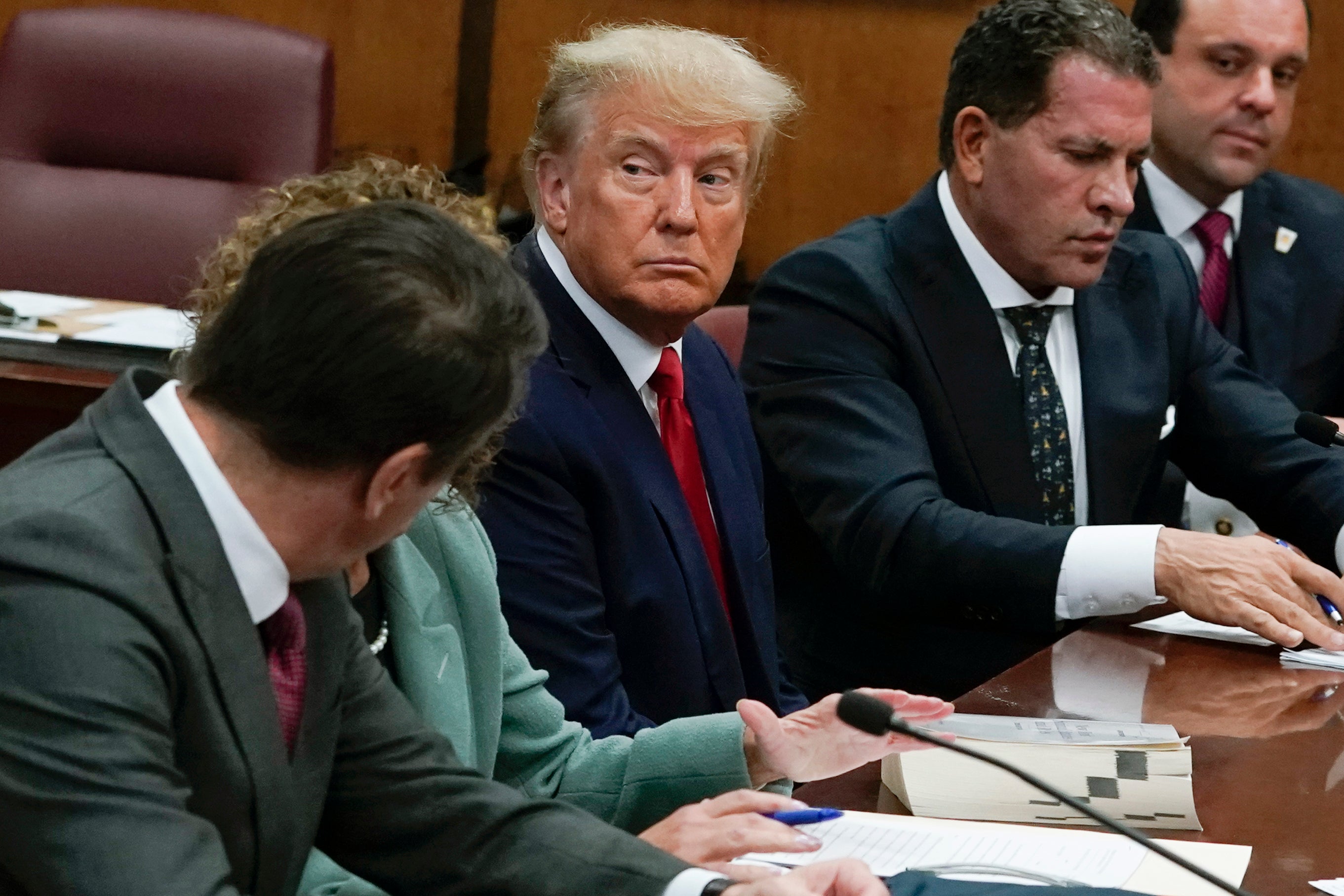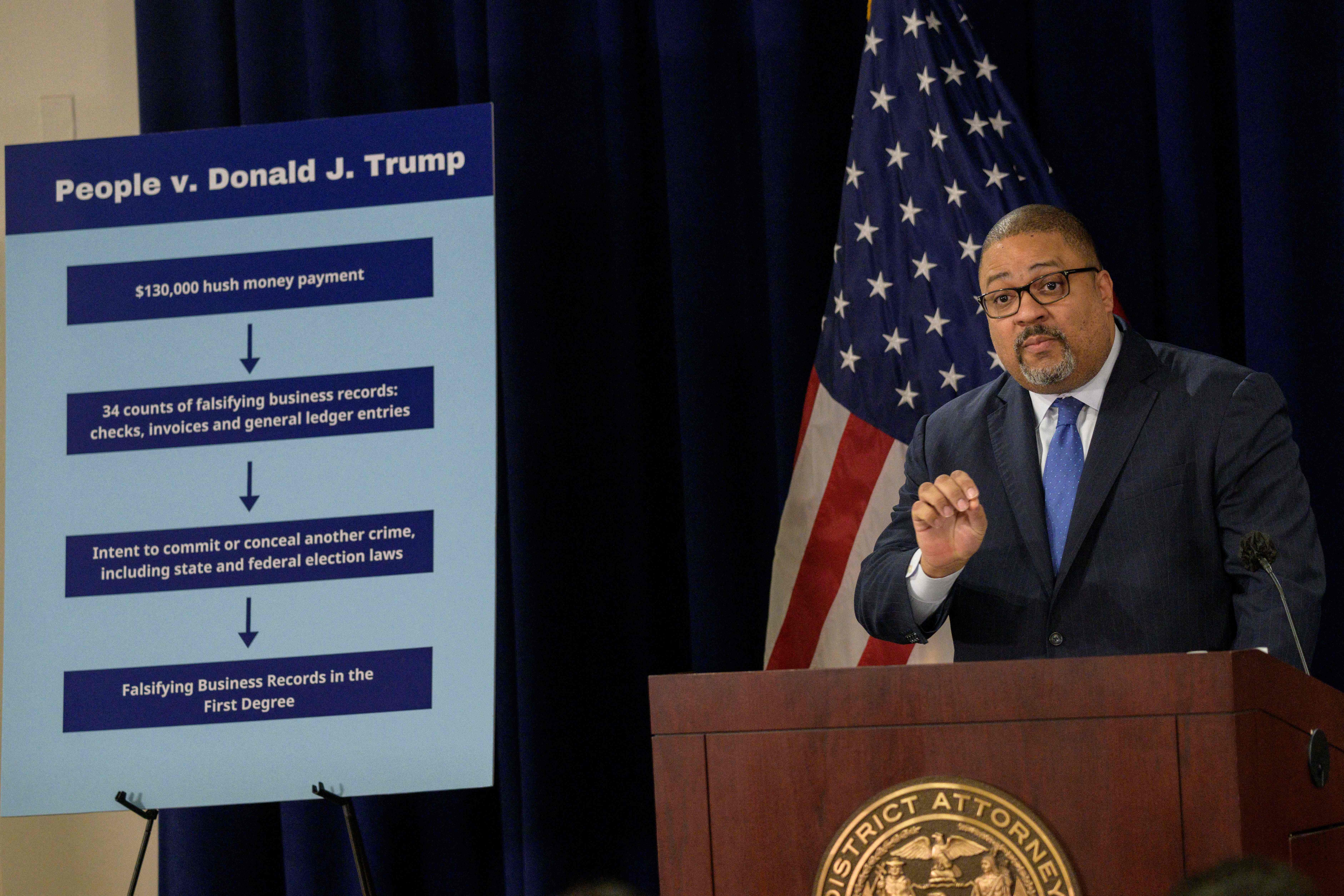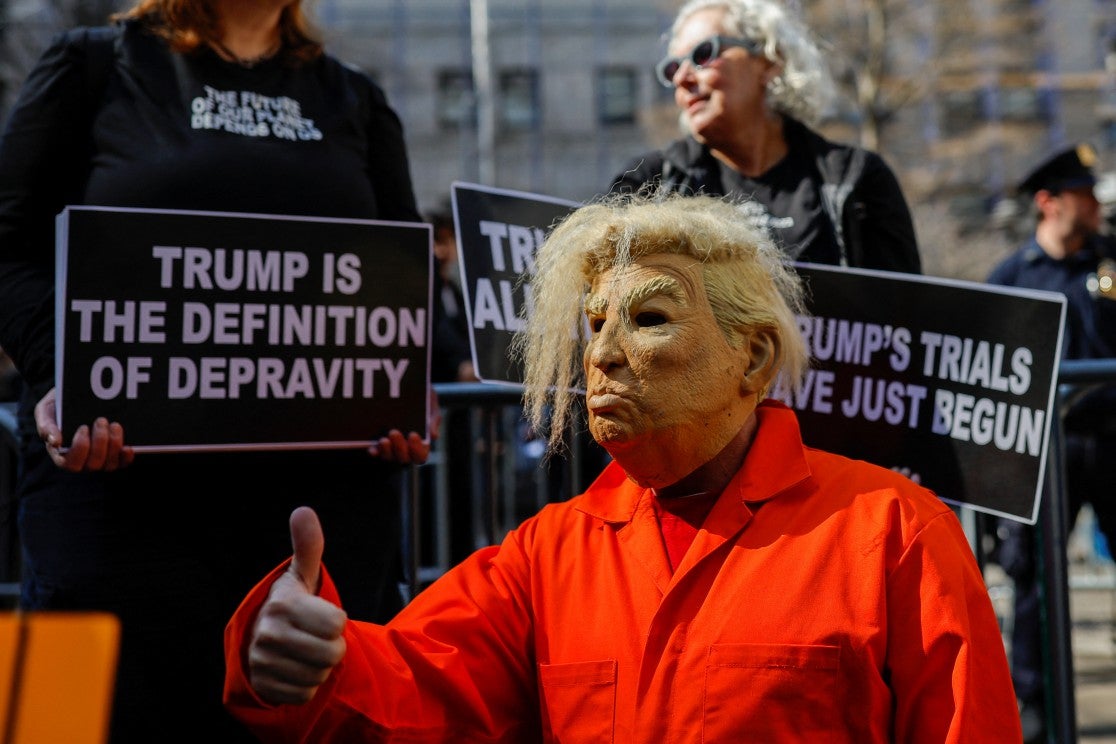
Donald Trump has officially been arraigned on 34 counts of falsifying business records, making him the first former US president to be a defendant in a criminal case.
Mr Trump pleaded not guilty in proceedings before New York Supreme Court Justice Juan Merchan, the same judge who last year presided over the criminal tax fraud trial of two of the ex-president’s companies.
The indictment in People of the State of New York v Donald J Trump lays out the specific charges against the twice-impeached ex-president, who has spent the five days since it became known that he’d been indicted railing against the case and attacking the Manhattan prosecutors who are leading it.
It alleges that he falsified records kept in a ledger for the trust he established for his businesses when he entered the White House in 2017, the Donald J Trump Revocable Trust, on multiple occasions, with the aim of concealing payments to two women with whom he had affairs, in order to silence them and keep their accounts of their liaisons from harming his chances of winning the 2016 presidential election.
In an accompanying statement of facts filed with the court, prosecutors allege that Mr Trump “repeatedly and fraudulently falsified New York business records to conceal criminal conduct that hid damaging information from the voting public during the 2016 presidential election” through a “scheme” carried out from August 2015 to December 2017.
The purpose of the “scheme,” prosecutors said, was to “to influence the 2016 presidential election by identifying and purchasing negative information about him to suppress its publication and benefit the Defendant’s electoral prospects”.
“In order to execute the unlawful scheme, the participants violated election laws and made and caused false entries in the business records of various entities in New York. The participants also took steps that mischaracterized, for tax purposes, the true nature of the payments made in furtherance of the scheme,” they added.

Prosecutors also cited an agreement between Mr Trump and National Inquirer publisher American Media Incorporated to “catch and kill” damaging stories about Mr Trump to show their intent to conceal the stories before the 2016 election.
In one example, they pointed to a payment to a former Trump Tower doorman who’d alleged — falsely, as it turned out — that Mr Trump had fathered a child out of wedlock, reviving a story first reported by The New Yorker during Mr Trump’s time in the White House.
They noted that after AMI determined the story was false and wanted to release the ex-doorman from an exclusivity agreement that kept him quiet, Mr Trump’s then-lawyer, Michael Cohen, told the company’s CEO not to do so until after the election.
American Media Incorporated has previously admitted in federal court documents that the payments made to individuals were meant to ensure those individuals “did not publicize damaging allegations” about Mr Trump “before the 2016 presidential election and thereby influence that election”.

In a statement, Mr Bragg said the facts laid out in the court documents described a “trail of money and lies” that “expose[d] a pattern that, the People allege, violates one of New York’s basic and fundamental business laws”.
“Manhattan is home to the country’s most significant business market. We cannot allow New York businesses to manipulate their records to cover up criminal conduct,” he said.
The women who Mr Trump is thought to have paid are Stormy Daniels, an adult film actress whose real name is Stephanie Clifford, and former Playboy model Karen McDougal. Ms McDougal was paid $150,000 by the National Inquirer for her silence, while Ms Daniels was paid by Cohen, in a scheme which led to the now-disbarred attorney spending a year in federal prison and two more on home confinement.
Cohen, who financed the payment to Ms Daniels through a bank loan he’d obtained, was reimbursed by Mr Trump, whose trust allegedly disguised the payments as compensation for legal services pursuant to a non-existent retainer agreement.

Cohen also worked with the Trump Organization’s former Chief Financial Officer, Allen Weisselberg, to disguise the reimbursement payments so he could falsely claim them as income on his tax returns.
The Manhattan DA’s statement of acts says Cohen sent monthly invoices to the Trump Organization “falsely requesting payment of $35,000 for legal services rendered in a given month of 2017 pursuant to a retainer agreement,” though no such agreement existed.
Prosecutors alleged that Cohen recieved approval for this arrangement during a meeting with Mr Trump in the Oval Office just one month after he was sworn in as president.
At a press conference late Tuesday, Mr Bragg said Mr Trump’s alleged falsification of records was intended to conceal violations of New York State election law, including one section that makes it a crime to promote a candidate “by unlawful means”.
The statement of facts filed by Mr Bragg’s office also makes repeated reference to the scheme that led Cohen to face a prison sentence, though it refers to him only as “Lawyer A” and does not mention him by name. It also refers repeatedly, but not by name, to Weisselberg, who last year pleaded guilty to criminal tax fraud charges and is finishing a five-month jail sentence after testifying at the criminal tax fraud trial of two Trump Organization subsidiaries.
Neither Ms Daniels or Ms McDougal are referred to by name, but the facts of the case match up with multiple public accounts of the hush money schemes perpetrated by Mr Trump and his associates or with court documents from the federal criminal case against Cohen.
The indictment against Mr Trump makes him the first former US president to face criminal charges in the country’s nearly 250-year history. Federal authorities once considered seeking an indictment against former president Richard Nixon for crimes he committed while in office, but the pardon issued to him by his successor, Gerald Ford, made charging him impossible.
Unlike the charges that were never filed against Nixon, who died in 1994, the charges against Mr Trump have been filed in state court and cannot be short-circuited by a future presidential pardon.
If convicted, he could face at least a year in prison on each count, but it’s unlikely that a first-time offender such as himself would be sentenced to prison rather than probation.







